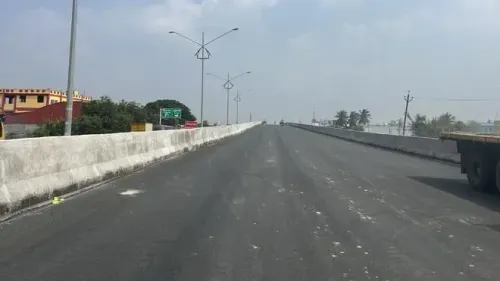Could the Collector's Court in MP Really Fine Shrikant Dixit Over Rs 124 Crore for Illegal Mining?

Synopsis
Key Takeaways
- Record fine of over Rs 124 crore imposed for illegal mining.
- The ruling highlights the need for strict enforcement of mining laws.
- Investigations revealed significant environmental violations.
- Dixit’s case could set a precedent for future illegal mining cases.
- Local communities support actions against illegal mining.
Panna, Sep 27 (NationPress) In a significant move against illegal mining, the district collector's court in Panna district has levied a staggering fine exceeding Rs 124 crore on Shrikant Dixit.
The hefty penalty arises from allegations of unauthorized stone extraction in Bilgarhi village, situated in Gunaur tehsil.
A government release indicated that on September 25, Collector Suresh Kumar imposed a fine of Rs 1,245,585,600 on Dixit for illegal gravel mining activities in Gunaur.
This fine follows thorough investigations conducted by mineral and revenue officials. Despite multiple hearings and chances to provide a defense, Dixit's legal team was slow to respond.
Investigations uncovered excessive excavation beyond sanctioned limits, alongside significant royalty evasion valued in crores.
The court mandated a double penalty for non-compliance with payment orders. Subsequently, Dixit submitted a writ petition to the High Court requesting dismissal of the case and action against the Collector. Shrikant Dixit runs a diamond stone crushing operation in the area.
Authorities assert that Dixit partook in extensive illegal stone extraction without the necessary permits, breaching both environmental and mining regulations. The fine, which surpasses Rs 124 crore, stands as one of the most substantial ever imposed on an individual for mining-related infractions in the district.
The Collector's Court arrived at the amount after an in-depth inquiry into the scale of unauthorized mining activities.
Officials revealed that the penalty was determined based on the volume of illegally sourced materials, the duration of these activities, and the environmental harm inflicted.
This ruling reflects the administration's commitment to combating illegal mining practices that have long afflicted the mineral-abundant region of Panna.
Local reports indicate that these mining operations had persisted for several years, prompting numerous complaints from residents and environmental advocates.
The crackdown is occurring in response to rising public demands for accountability from powerful individuals engaging in ecological violations.
Political responses have been rapid. Dixit has yet to make a public statement, leaving his next course of action uncertain.
The situation has ignited widespread discussions throughout Madhya Pradesh, with many advocating for stricter enforcement of mining regulations and enhanced scrutiny of political figures involved in business endeavors. Environmental organizations have praised this decision as a triumph for sustainable governance and a warning to others who unlawfully exploit natural resources.
As the legal proceedings progress, attention remains on Dixit's next steps and the potential for this case to serve as a benchmark in the fight against illegal mining in the state.









